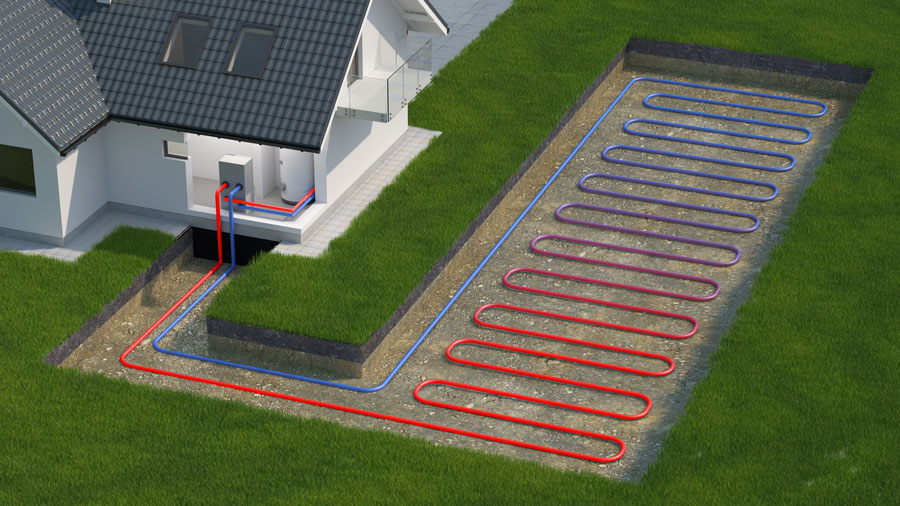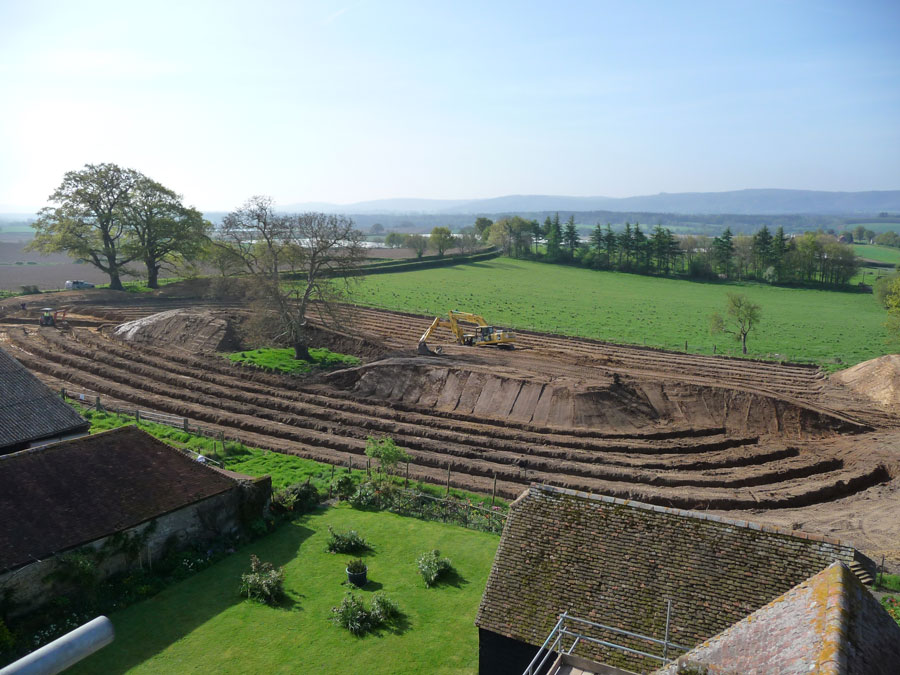
Ground Source Heat Pumps (GSHP)
What is a ground source heat pump?
The temperature of the earth one metre below ground is relatively constant at about 7°C - 13°C all year round. Contrary to popular belief, this is solar heat stored in the ground over the course of the year rather than geothermal heat coming from the centre of the earth. Ground Source Heat Pumps (GSHPs) take heat stored in the earth using a system of pipes buried in the ground; this heat is then raised in temperature to allow both space and hot water heating. GSHP units consist of a heat pump, circulation pumps, a control system and an additional backup heat source should it be required.
The basic principles of the GSHP begin with the absorption of heat from the heat source (rock, ground or lake using a closed circuit of pipes that contain a mixture of water and antifreeze. The heat pump itself is a unit that works on the same principles as a domestic fridge. The collector fluid then transfers its heat to the refrigerant fluid in the heat pump's evaporator. The refrigerant turns to a gas (it is carefully chosen to have a low boiling temperature) and is then compressed. As it is compressed the temperature of the refrigerant gas increases to more than about 80oC and it is fed into the heat pump’s condenser where it transfers its energy to the water in the heating system of the house. The condenser of the heat pump acts a source of high temperature energy for the house, rather like a boiler in a conventional heating system. At the same time as the energy in the refrigerant is transferred to the heating system it cools down and condenses back to a liquid so the cycle can start again.
Wet, sandy soil or clay soils are always satisfactory as heat sources for a ground source heat pump. Dry soils are more of a problem as the heat storage and transfer will be less satisfactory. This increase costs as a larger collector with more pipework and excavation will be needed. A lake or river can be a good and cheap location for a heat collector. When neither enough land area for a normal collector nor a lake or river is available, drilling boreholes becomes an option. In the UK drilling can be an expensive exercise because the geology in much of the country 100-200m below ground level is very varied and hard to predict. Drilling companies have to be prepared for many eventualities and are reluctant to provide fixed price quotations.
How does a ground source heat pump work?

In a well-insulated house a heat pump can reduce energy bills by around 70% compared to oil. When run efficiently at about 45°C, they can produce four or even five times as much power as they use, this is measured by the Coefficient of Performance (COP). A COP of 4 means that for each kilowatt of electrical energy provided to the heat pump 4 kilowatts of heat energy will be provided to your house. Unfortunately, with older properties, the ideal level of insulation required for a GSHP to be fully effective during the very coldest days of the year, cannot always easily be achieved. The higher the temperature a GSHP runs at, the harder it has to work and the less efficient it becomes.
What are the benefits of ground source heat pumps?

A well installed ground source heat pump is probably the most efficient way to heat your home. It will make a big reduction in your carbon footprint that will get more significant as the electricity network is further decarbonised, and it will also reduce your running costs.
A good heat pump installation will use weather compensation to vary the temperature in your radiators depending on the outside temperature. This means your house will always be warm and is the most efficient way to run a heat pump. This is unlike a traditional boiler setup, where the boiler is constantly switching on and off, to attempt to regulate the temperature of the house, set at the thermostat. This will make the house feel more comfortable as it will not cool down overnight when normally boilers are turned off.
What are the pros and cons of ground source heat pumps?
- Most efficient form of heating available
- They benefit from a £6000 government grant
- Long life span
- Weather compensated
- Expensive to install, especially if you don’t have a large garden. For is the reason for the government grant
- In the UK they are a relatively new technology and so there are fewer qualified and skilled installers than there are for gas boilers. For them to work well it is vital that they are installed properly. If not they can be an expensive mistake.
- Depending on the plumbing in your house you may need to replace or install a new hot water tank